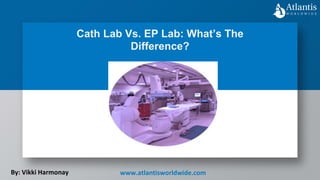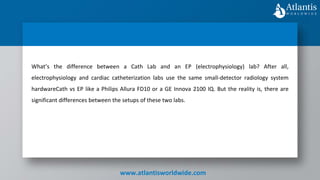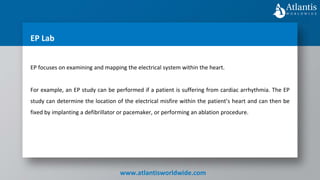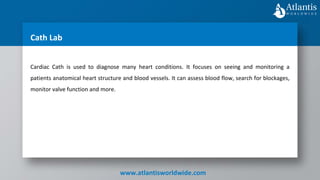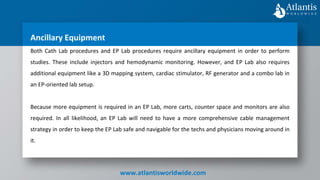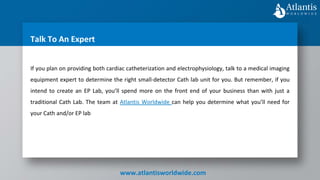Cath Lab Vs. EP Lab: WhatˇŻs The Difference?
- 1. Cath Lab Vs. EP Lab: WhatˇŻs The Difference? By: Vikki Harmonay www.atlantisworldwide.com
- 2. www.atlantisworldwide.com WhatˇŻs the difference between a Cath Lab and an EP (electrophysiology) lab? After all, electrophysiology and cardiac catheterization labs use the same small-detector radiology system hardwareCath vs EP like a Philips Allura FD10 or a GE Innova 2100 IQ. But the reality is, there are significant differences between the setups of these two labs.
- 3. www.atlantisworldwide.com EP Lab EP focuses on examining and mapping the electrical system within the heart. For example, an EP study can be performed if a patient is suffering from cardiac arrhythmia. The EP study can determine the location of the electrical misfire within the patientˇŻs heart and can then be fixed by implanting a defibrillator or pacemaker, or performing an ablation procedure.
- 4. www.atlantisworldwide.com Cath Lab Cardiac Cath is used to diagnose many heart conditions. It focuses on seeing and monitoring a patients anatomical heart structure and blood vessels. It can assess blood flow, search for blockages, monitor valve function and more.
- 5. www.atlantisworldwide.com Ancillary Equipment Both Cath Lab procedures and EP Lab procedures require ancillary equipment in order to perform studies. These include injectors and hemodynamic monitoring. However, and EP Lab also requires additional equipment like a 3D mapping system, cardiac stimulator, RF generator and a combo lab in an EP-oriented lab setup. Because more equipment is required in an EP Lab, more carts, counter space and monitors are also required. In all likelihood, an EP Lab will need to have a more comprehensive cable management strategy in order to keep the EP Lab safe and navigable for the techs and physicians moving around in it.
- 6. www.atlantisworldwide.com Personnel Required Both Cath and EP Labs have a team of staff members to assist physicians with cardiac catheterization. However, a second, smaller team with additional training is required to assist in EP-oriented lab setups. If you are considering creating a multi-use Cath lab system, you may need to provide additional staff training above and beyond the use of the new equipment.
- 7. www.atlantisworldwide.com Talk To An Expert If you plan on providing both cardiac catheterization and electrophysiology, talk to a medical imaging equipment expert to determine the right small-detector Cath lab unit for you. But remember, if you intend to create an EP Lab, youˇŻll spend more on the front end of your business than with just a traditional Cath Lab. The team at Atlantis Worldwide can help you determine what youˇŻll need for your Cath and/or EP lab
- 9. Contact Us 60 East 42nd Street, Suite 4600, New York, NY 10165 Phone: 1-212-366-9100 Toll Free: 1-800-533-3356 Fax: 646-762-6562 info@atlantisworldwide.com https://www.atlantisworldwide.com https://info.atlantisworldwide.com/blog

